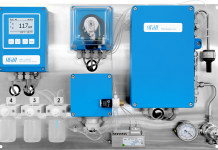With the beginning of the new calendar year, the REACH deadline in 2018 is approaching even faster. The European Chemicals Agency (ECHA) has repeatedly urged industry to prepare for the registration deadline. A number of new initiatives from ECHA and the European Commission will facilitate the way forward for registrants, report Jens Tørsløv and Anne Rathmann Pedersen. Both are Senior Consultants with DHI, Environment and Toxicology, where they specialize in impacts of chemical substances.
More user-friendly database of chemicals
ECHA has the most exhaustive information database of chemical substances based on publicly available information on chemical substances registered since the start of REACH. “It is already possible to access this information but this year, ECHA will make the access even more user-friendly,” Jens Tørsløv says. Through the new web page, it will be possible for consumers or companies to obtain short substance specifications (Info Card) but also more detailed specifications will be available through a brief substance profile (Brief Profile). In addition, the web page will offer a complete and detailed overview of available substance data as well as the legal requirements on the individual substances.
Online registration
“The improved access is part of ECHA’s ongoing activities to update their portals and its tools”, Jens Tørsløv says. It will also be possible to register substances online and without local installation of the IUCLID database. This may be relevant for registrants who are part of a joint substance registration and only need to submit company specific data.
Strengthening the principle of One Substance One Registration
The upcoming Implementing Regulation on data sharing from the European Commission empowers ECHA to enforce the OSOR principle (One Substance One Registration). “The aim is to ensure effective application of REACH with regard to the data sharing process,” Anne Rathmann Pedersen explains. The draft Implementing Regulation holds provisions on transparency in data sharing and in data sharing agreements along with provisions on fairness and non-discrimination for cost sharing.
“The regulation will limit the number of individual submissions”, Anne Rathmann Pedersen adds. It will help registrants of the same substance to agree on data sharing and will ensure a proportionate way forward for registrants who are blocked due to disputes in the SIEF process (Substance Information Exchange Forum). However, a full or a partly opt-out from the joint submission is still possible. In case of disputes, ECHA has the mandate to resolve.
Easier to clarify same substance identity
ECHA will introduce sector-specific substance identification guidance to make it easier to clarify same substance identity and to identify and confirm co-registrants of same substance in the pre-SIEF process. The guidance will not replace the official guidance on substances identity, but will work as support for registrants within specific sectors.
Facts about DHI
Provides consultancy services within water, environment and health to:
- public and governmental authorities
- industry sectors such as chemicals industries, ports, water utilities, energy, infrastructure and transportation
- consulting engineers and contractors
- Operates globally and has offices in more than 30 countries
For more information www.tox.dhigroup.com














